A little memory loss. Short term memory loss is a helpful attribute for a politician. Consider this morning’s Twitter:
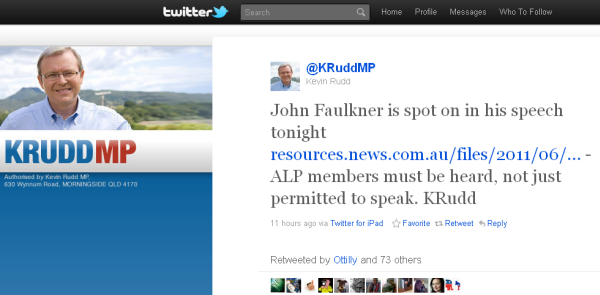
All the way from the Middle East and warning Moammar Gadhafi that his days are “well and truly numbered”, Kevin Rudd found time to endorse remarks by his former ministerial colleague John Faulkner.
Including, presumably, this comment by Senator Faulkner:
“Once, our test for whether or not our policies met the expectations of the community was Conference. The arguments on Conference floor when they didn’t were audible — blocks away.
At Labor’s last National Conference, not a single contested measure was put to a vote on the Conference floor.
This is seen by some to be a triumph of Party management. Dissent is contained behind closed doors. All potential embarrassment is avoided.
I see it rather as a symptom of the anaemia that is draining the life from the Australian Labor Party — an apparent aversion to the unpredictability of democracy.”
Now hang on a minute. Kevin Rudd was Labor’s Parliamentary Leader at the time of the last Labor National Conference! He was the person most responsible for the absence of contested measures because of “an apparent aversion to the unpredictability of democracy.”
Then there’s this Faulkner observation:
“There is nothing wrong with using polling and focus groups to test advertising strategies, explore misunderstandings of, or misapprehensions about, our policies, or to focus and sharpen what we say about what we believe.
There is, however, something deeply wrong when we use polling to determine our Party’s policies, and even our values.
Labor must never forget that you do not earn the right to lead by perfecting the art of following.”
Yet wasn’t Kevin Rudd the Prime Minister who abandoned the great moral challenge of our time because he was told the focus groups showed people were not supporting his carbon pricing initiative?
So maybe it was just this Faulkner reference that our Foreign Minister was endorsing with his Tweet:
“Party discipline is essential when it comes to legislative votes, but was never intended to be used to block parliamentarians from talking to their constituents about their decisions and their opinions. If they are trusted enough by the Party to be chosen as parliamentary representatives, they ought to be trusted enough to speak aloud in public without a pre-scripted song-sheet of lines of the day.”
No. Even a deposed Labor Leader could not be that hypocritical having been the one who presided over turning members into puppets reciting their prepared statements when allocated the task of “doing the doors” for the television grabs and reading out prepared Dorothy Dixers during question time.
There must have been something in Senator Faulkner’s Wran lecture that I missed that earned the Rudd commendation. If you find it, please let me know.
Wise after the event. As to Senator Faulkner’s role as a critic of what has happened to Labor’s version of participatory democracy, I would just make this simple observation: he didn’t show much enthusiasm for promoting the views he now espouses when he was a senior member of the Labor Government leadership team. Talk after the event can be easier than action during it.
A little success on the binge drinking front. Federal Health Minister Nicola Roxon should be pleased that her advocacy of increased taxes on ready-to-drink spirits has clearly resulted in a drop in consumption.
Australian Bureau of Statistics figures this week show that per capita consumption of pure alcohol in RTD’s during the year ended 30 June 2010 was 0.7 litres — down from a peak of 1.09 litres back in 2008.
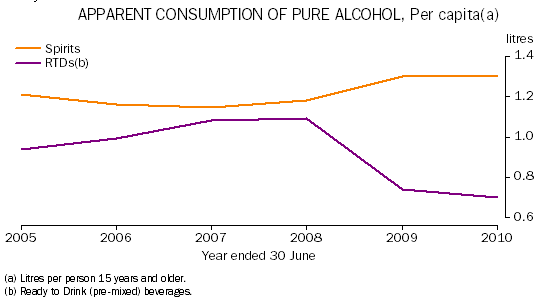
And while there has been a small increase in ordinary spirits accompanying the decline in RTD’s, the total consumption of spirits is down from 2.26 litres of pure alcohol per head to 2 litres in 2010.
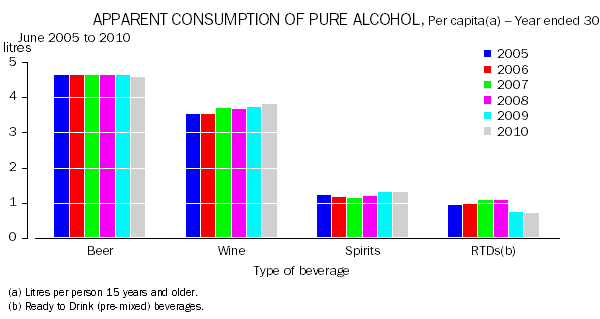
The slight increase in total alcohol consumption that has worried many health activists recently also appears to have come to an end. Total consumption in 2010 of 10.27 litres per head was down 2007’s 10.57 litres.
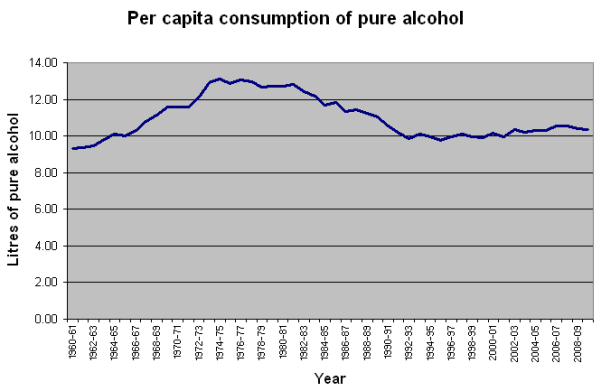
The long term trend in consumption does illustrate the extent to which Australia is becoming less of a beer drinking nation. The way things are going wine will soon be the primary source of alcohol.
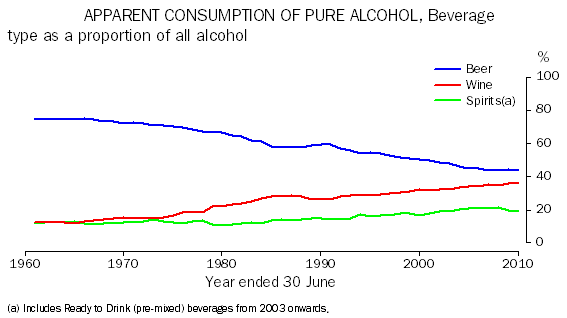
Presumably those interests determined to try and put further curbs on alcohol consumption will now be turning their attention to the way wine is taxed. Under the current arrangements the alcohol in wine is far cheaper than that in beer and spirits.







Its a pity that supporters of the alcopop tax keep thinking that the only subsititue for RTDs is to bottled spirits. It is widely acknowledged by business analysts that beer sales benefited as dark spirit RTDs (bourbon and cola, rum and cola, etc) were replaced by full strength beer. As an ex-alcohol industry person you should know that.
If fact, the RTD tax managed to turn around a 15 year-long decline in beer consumption.
And according to the government-funded ASSAD survey of secondary school students’ use of alcohol and drugs conducted in the second half of 2008 – so a few months after the tax came in – it did not alter the product preferences of underage drinker’s one bit.
Stephen Riden
DSICA
Faulkner was having a go at Rudd and he agrees?